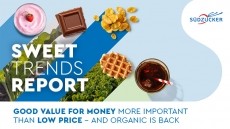Breaking consumer ties with junk food brands could backfire

Million-dollar marketing campaigns for junk food mean individuals build strong links with certain brands – to the point of incorporating certain brands into their concept of self.
And although weakening this bond might imply an uptake of healthier foods, researchers from Layola University, Maryland have found the opposite to be true.
“Dissociating from beloved brands is quite difficult and drains self-regulatory resources (…) because it necessitates overriding psychological associations between the brand and the self," they wrote.
“Thus, self-brand dissociation depletes [these] resources, which in turn inhibits people's ability to override natural preferences.”
This ‘natural preference’ was for energy-dense foods that were high in sugar and fat. A liking for vegetables, on the other hand, must be fostered through socialisation or introducing vegetables at a young age.
Therefore, after brand dissociation, interest in consuming vegetables - a learned preference - would decrease.
The findings had important implications for public health advocates, the authors wrote.
“Prompting dissociation (…) among people who have strong relationships with the brand (arguably those who would benefit most from the intervention) can backfire (...), thus leading to poorer dietary choices.
“Treading carefully when attempting to improve people's health is consistent with the recommendation to nudge, instead of force, people to improve the healthfulness of their food choices."
The researchers also suggested retailers apply the same marketing techniques to vegetables, such as adorning packaging with cartoon characters, to create a favourable product bias for healthy foods.
The study
The researchers conducted three separate experiments, each involving between 100 and 178 male and female participants.
In the first study, subjects completed a computer-based brand dissociation task where they were shown images of Reese’s chocolate (found to be the most popular confectionery item in a pre-test) and were induced into selecting a ‘Not Me’ key while a control group selected ‘Me’.
After completing a filler task to obscure the true purpose of the study, they were invited to eat carrot sticks. As predicted, subjects in the ‘Not Me’ group ate fewer carrots than the control.
The second study went further, assessing the extent to which the level of association with Reese's reduced self-reported interest in eating a range of vegetables - asparagus, broccoli, green salad, guacamole, and spinach - and other foods including fruit, potatoes and chicken.
Those who identified strongly with the brand had less interest in eating vegetables after disassociation – but appetite for the other foods had not decreased.
“This is the case because unlike vegetables, these foods all have flavours (sweet, salty, and/or fatty) that humans are genetically predisposed to prefer, and thus consumption of them (or contemplation of doing so) does not require self-regulatory resources on reserve.”
For the third study Trump et al. widened the scope of the task. After completing a dissociation writing task, in which participants detailed three different ways Coca-Cola did not represent them as a person, they then rated their interest in eating the same selection of foods for study two. Again, a reduced interest in eating vegetables was noted.
"Our research also provides additional evidence that branding is a powerful marketing tool that is often resilient to interventions when people have strong relationships with brands."
The researchers have called for future research to determine whether the findings hold true for food categories, such as chocolate, and not just individual brands.
They also suggest conducting a study with a more long-term focus as sustained dissociation from junk food brands could, over time, reduce preference for such brands.
Source: Appetite Journal
“Dissociation from beloved unhealthy brands decreases preference for and consumption of vegetables.”
First published online 22 May 2015, doi:10.1016/j.appet.2015.05.025
Authors: R. Trump, P. Connell and S. Finkelstein

























